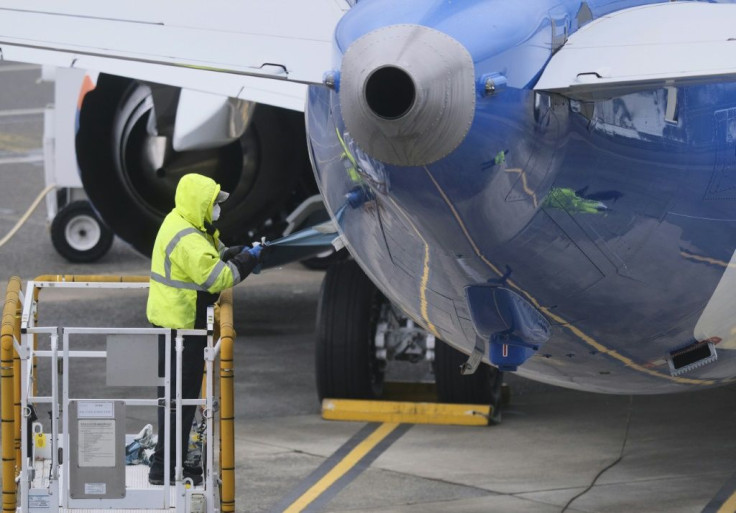Boeing To Cut Staff, Plane Output As Pandemic Batters Airline Industry
Boeing announced sweeping cost-cutting measures Wednesday as it reported a first-quarter loss of $641 million after suffering a damaging hit to the airline business from the coronavirus pandemic.
The aerospace giant plans to reduce its workforce by 10 percent through a combination of voluntary and involuntary layoffs and will slash production of its main commercial planes, including the 787 and 777, Chief Executive David Calhoun said in a message to employees that accompanied an earnings release.
"The aviation industry will take years to return to the levels of traffic we saw just a few months ago," Calhoun said. "We have to prepare for that."
Calhoun said the job cuts would be deeper -- more than 15 percent -- in commercial airplanes and services, as compared with defense and space systems, where the business has been more stable.
The company had 160,000 employees prior to the announcement, putting the downsizing at about 16,000 jobs.
The quarterly loss of $641 million compared to profits of $2.1 billion in the same three-month period a year ago. Revenues fell 26.2 percent to $16.9 billion.

And total debt at the end of the quarter had swelled to $38.9 billion, up from $27.3 billion at the end of December.
Calhoun said the belt-tightening was needed to maintain adequate liquidity at a time its revenues are depressed, adding that the company is "exploring potential government funding options" in the wake of COVID-19.
Shares rallied following the announcements, including Boeing's statement that it "will be able to obtain sufficient liquidity to fund its operations."
Boeing has previously called for $60 billion in government support for the US aerospace industry. The federal "CARES Act" legislation includes $17 billion earmarked for the company.

Calhoun said the company would weigh potential support from the US Treasury against private sources, noting that credit markets have improved in the wake of the CARES Act and moves by the Fed to pump cash into credit markets.
"We're going to evaluate all these options," Calhoun said in an interview with CNBC Wednesday. "We need liquidity."
Executives also said the company hopes to maintain its investment-grade credit rating.
Factors in the first-quarter loss included "abnormal production costs" connected to the temporary suspension of Puget Sound manufacturing operations due to COVID-19 and due to the suspension of production of the 737 MAX, which has been grounded worldwide for over a year following two deadly crashes.
Boeing said the pandemic crisis has hit demand for new planes and services, with airlines delaying purchases of jets, slowing delivery schedules and deferring elective maintenance.
The company this year will cut production of the 787 to 10 a month from 14, and gradually reduce that to seven a month by 2022. It also will trim output of the 777 and lower its targets for the 737 MAX.
"We have done a tremendous job of increasing our production rates and services offerings in recent years," Calhoun said. "But the sharp reduction in our demand for our products and services over the next several years simply won't support the higher levels of output."
Calhoun told CNBC the company has made progress with regulators on the MAX, but that "there is still a mountain of documents that have to be completed."
The jet has been grounded since March 2019 following two crashes that killed 346 people.
On a conference call with analysts later Wednesday, Calhoun said the company expects to resume MAX deliveries in the third quarter. Boeing currently has some 450 MAX planes in storage.
Calhoun said MAX customers have varied in their preference for delivery, with some seeking to push back and others wanting the plane as soon as possible. The CEO expects the coronavirus crisis to prompt more airlines to retire older planes and seek newer models that like the MAX are more fuel-efficient.
Boeing's share price jumped 8.0 percent to $141.87 in late-morning trading.
© Copyright AFP 2024. All rights reserved.





















